Inquiring Minds Want to Know
I really love it when readers leave comments on my posts. You know that feeling when you get a package in the mail? Yeah, that’s what it’s like for me when I get a comment notification.
It lets me know that what I write is being read, making people think, and, more importantly, ENJOYED!
Last week, an insightful reader named Gabby commented on my post, “What Does a Closed Captioner Do,” and asked a list of questions about the difficulties of captioning live television.
They’re questions I get a lot when people find out what I do for a living, so I thought I’d use Gabby’s questions and write a post about what is going on in a captioner’s brain while we’re writing live television.
Hi, I’m a Captioner’s Brain, and I Multitask. A LOT.
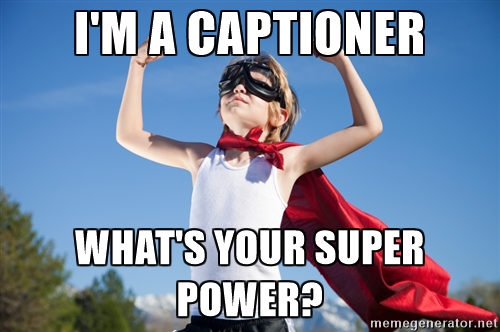
When I’m writing a live TV show, my brain is doing like, a million things all at once.
No, seriously.
Well, maybe a million is a bit of an overstatement. But as we write what we’re hearing, the captioner’s brain is simultaneously making many mini-decisions in a split second .
My answers to Gabby’s questions below will really give you a peek into the complex workings of a captioner’s brain.
When words sound alike such as “to, too, two,” is it confusing remembering the correct strokes?
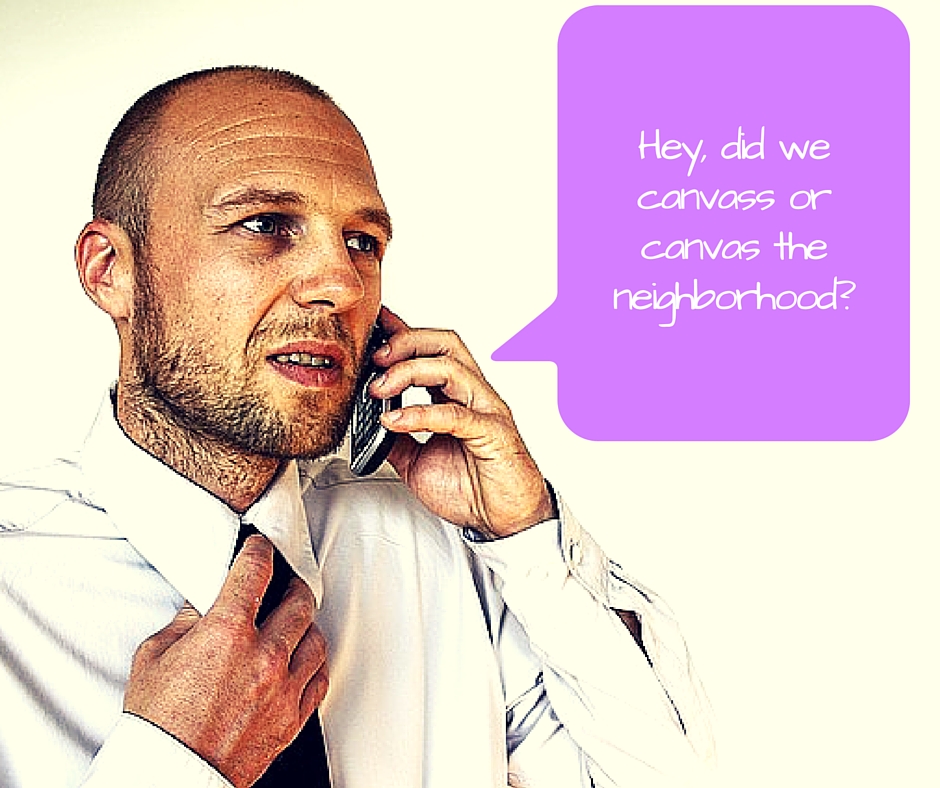
Not really. It’s been burned into our brains and fingers since we first started learning to write on our machines.
If you were watching your favorite show and a caption popped up and said, “I want two go too the game,” you’d think that captioner had been hitting the sauce.
When we’re in school, we’re taught how to write homophones differently. So I have three separate strokes for to, too, and two. In fact I have separate strokes for EVERY homophone.
Do you know the difference between marshal, marshall, and martial? How about karat, carat, and caret? Or my favorite, canvas and canvass.
Ah, the English language. How it can make you want to bang your head against the wall.
And while we’re on the homophone subject, the same principle applies to people’s names. It’s a MAJOR pet peeve of mine.
Alan, Alen, Allen.
Brittany, Britney, Brittanie, Bretagne.
Emily, Emilee, Emmalee.
Caitlyn, Caitlin, Kaitlyn, Kaitlin, Catelyn.
Ugh, you get the idea.
Please, parents, do captioners a favor. Don’t be cute and spell your kid’s name funky. 🙂
How do you remember all the entries in the your dictionary?

It’s magic.
When I was training to become a captioner, I actually asked the same question to my instructor. She said you just know.
I thought she was nuts. How can you memorize a 150,000+ word dictionary? But she was right.
Don’t ask me how, but I have a pretty good idea when I hear a word whether or not it’s in my dictionary.
If someone says something you don’t have in your dictionary, can you add new terms on the spot?

As much as I wish I could, I cannot add entries to my dictionary when I’m live. I have to work with what I’ve got.
Even though my dictionary is pretty large, there’s still thousands of words that’s not in there because I haven’t came across them yet.
People like to make up words on the fly, and there’s probably some spelling of Caitlyn out there I haven’t come across either.
If they do say something that I know isn’t in my dictionary I have a couple options:
Fingerspell that sucker out as best as I can. It may not be correctly spelled, but hopefully it’s close enough you can get the idea. It does help if I’m able to watch the show I’m captioning because the person’s name, city, or whatever is often flashed on the screen and I can spell it out.
But fingerspelling has its challenges because I still have to keep up with what’s being said. Having to fingerspell a name like Willacoochee is going to take up precious milliseconds when someone is talking really fast.
Try to write around it and write, “the player” or “the company, etc.” This is my last resort. I can’t just stop writing because something isn’t in my dictionary. The viewer isn’t going to know why I stopped. Similarly, I can’t just write it what I heard because it’s going to come up jibbersh the viewer isn’t going to be able to read either.
What about multiple speakers who may overlap each other in heated debates/conversations, do you have a captioner writing for each speaker?
Ha!
No, it’s just lil’ ole me captioning every speaker in an argumentative debate like that.
People who talk/yell/scream over each other make it tough on captioners. Basically, for me anyway, the loudest and most understandable people get captioned.
If I can make out what’s being said by a person I write them, then switch to the other person who is yelling/arguing and try to write what they’re saying in response. While I’m doing that, I’m also keeping in mind it’s got to make sense to a viewer.
There’s been a few times where I couldn’t understand what was being said by ANYONE. It’s times like that I just want to slap every last one of them.
Instead I just have to wait a few seconds and hope they calm down, breathe, or have a sudden attack of decorum so I can understand them.
What do you do when people talk too fast and you miss/forget what they said?
Freak out and hold on.
A lot of people are naturally fast talkers, others just talk fast because they’re nervous. Either way, they make me sweat bullets.
I’m being honest here. Sometimes me and my fellow captioners just can’t keep up with super fast talkers who talk over 300 words per minute for long bursts, especially if they’re talking over each other.
We’re all amazing and caption like a boss, but in the end we’re humans and have limitations just like everyone else.
When that happens, we as captioners just do the best we can. Usually this means we try to give you the Cliff Notes version of what was said, but still stick strictly with the original meaning and intent so the viewer understands.
Then we pray they take a breath or cough or something so we can catch up.
What do you do when you can’t understand someone’s heavy accent?
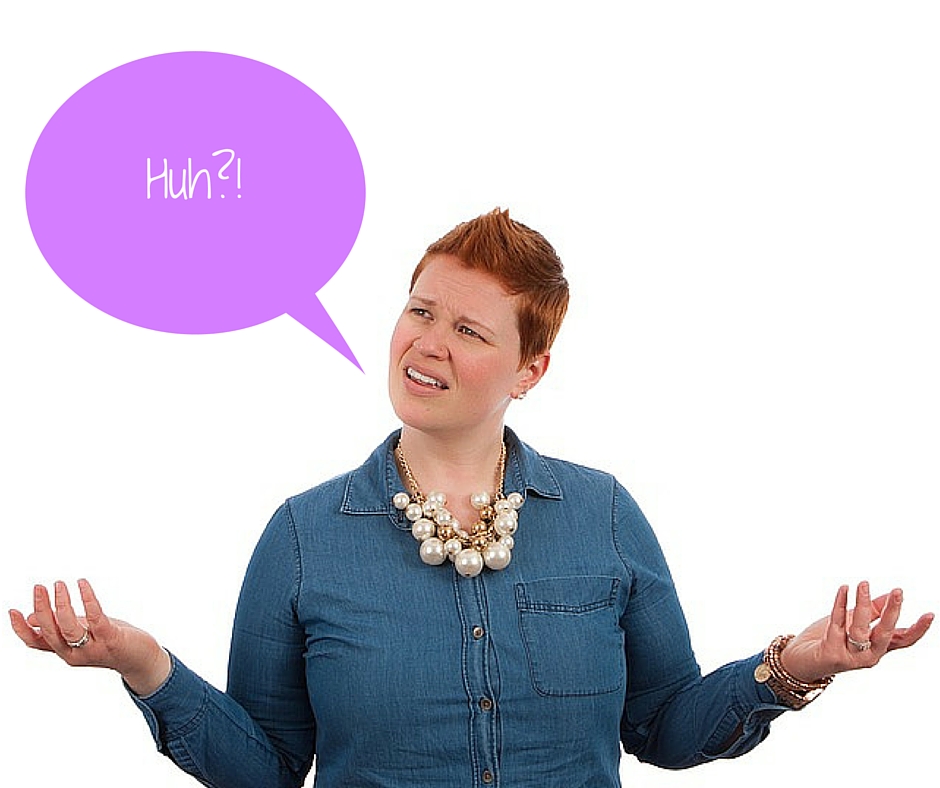
Scream.
It is very hard to write speakers who have heavy accents. I’ve literally just been staring at my computer screen going, what the heck are you saying? Is this even English?
Again, we just have to do the best we can and write what words we can decipher. (and hope it makes sense)
Is there anything you can think of that would help ease the mental intensity during your job?
God bless you for asking that question!
Unfortunately, no. Captioning is a very tough job that requires a high level of mental ability. As long as there’s live television, there will be pressure on captioners to do a near flawless job of getting captions to your screen.
Do you have any other questions you’ve always wanted to ask your captioner?
Captioning is Cool Steno Keyboard Throw Pillow
I love sharing knowledge about my job. Whether you’re considering a career in captioning, or you’ve just always wondered how captions work, if you’ve got a question, I’ll try to answer it. Just leave a question in the comments below. 🙂
&
&
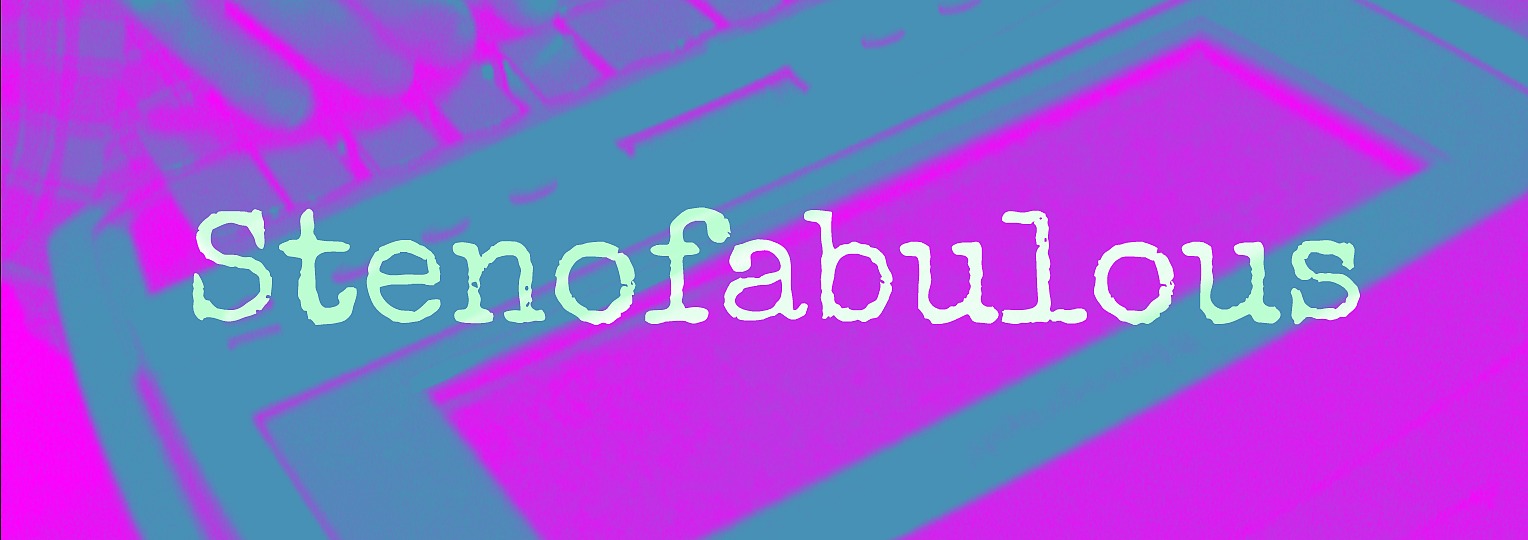
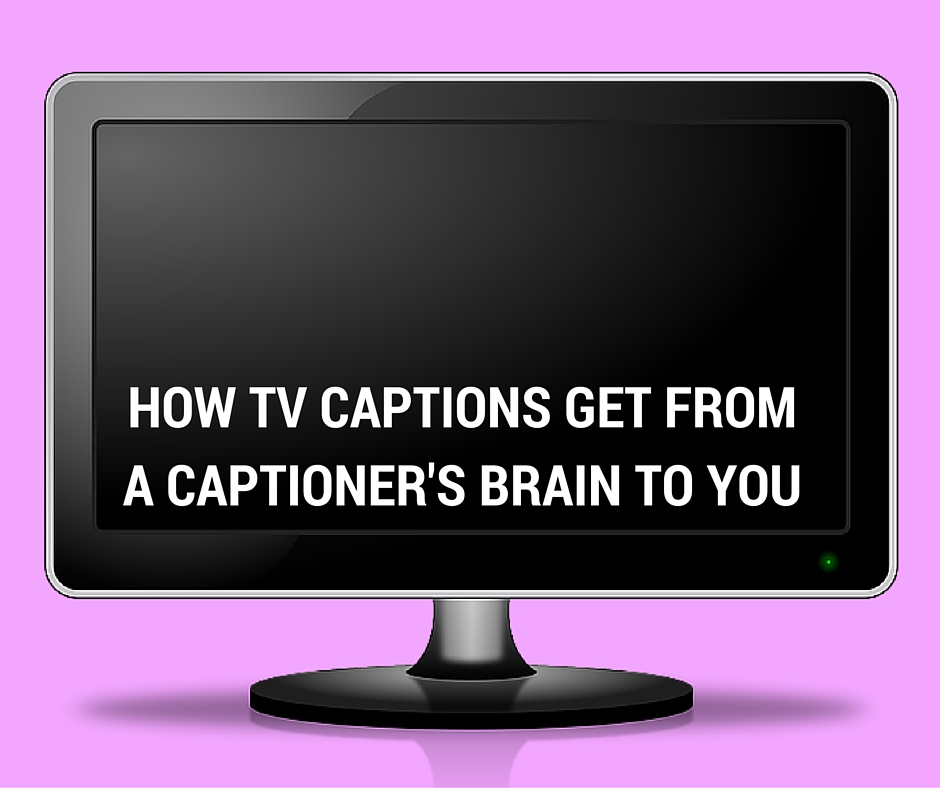
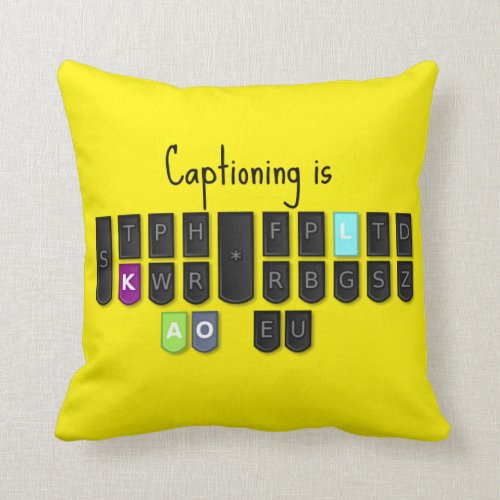
I really enjoyed reading this..I graduate this semester in voice captioning. Great info, for everyone ? ✌
Thank you so much for reading, and congratulations on your graduation 🙂
Fantastic blog post, thank you! I love the humour too 🙂
Thank you so much! I think that if something is entertaining, people will remember the info better. I try! 🙂
Great article, Julia! What a great site you’ve made! By the way, there are macros for instantly defining something on the fly while captioning. Takes some skill to learn to use them, but they’re great!
Thank you for stopping by! I have got to learn macros, it’s something I wasn’t taught, but there’s no time like the present. 🙂
I need to learn some of those macros.
I love your articles! Not only do you have the gift of being a captioner, you certainly know how to compose engaging — and funny – material… Well done!
Thank you so much, Tamra! I’m glad you like my style 😉
So what is the beginning salary of a captioner and what is the average salary of a 5-year veteran? Thank you for the info. (BTW, I’m a retired official reporter and now work part time as a freelance reporter, but I am asked that question from time to time and it would be nice to have an appropriate answer.) I enjoyed your article.
Since I’m an employee of a company, I can’t really give you a hard number. But I will say that my first year captioning I made as much as I did my best years as a seasoned and experienced court reporter. This year (my second full year of captioning) I should make more than I ever did being a court reporter.
I am deaf. Captioning is a ” WOW ” for those who have no auditory. Have you experience the captioning on YouTube ? One really needs a good imagination! ( this is a minor gripe, mind you. )
Hi there!
As far as I know Youtube is not live captioned by a realtime captioner like myself. I think Youtube has some sort of speech recognition program, or they are done by some typing them, and then pasting them into the recording. Don’t quote me though, I could be wrong 🙂
Thanks for commenting!
Nicely written! I am headed for a career in captioning after reporting in court for over 30 years, and I sometimes struggle to let people know exactly what captioners do. You have put it so well. Thanks!
I’m so glad you found it interested. Good luck in your career change!
I love this site. I’ve always wondered how captioning worked. I am hard of hearing and although I mostly do ok with my hearing aids I’m finding it is getting more and more difficult for me to hear the television these days and miss a lot. At first I just stopped watching because I missed so much. These days I watch a lot of netflix and I use the captioning feature whenever it is available and it has really made watching shows fun again. I know that you don’t do this sort of captioning but I did want to let you know how much it means for someone who actually uses it. I have seen mistakes and missed words and now I understand why it happens. Thank you for all you do. This is a very big deal to folks like me
Thank you so much for your kind words! It really means a lot. Oftentimes captioners just feel like nobody cares about what we do until we make a mistake. I’m so glad that you’re able to use captions on Netflix and you’re not missing out. You can binge watch your favorite shows 🙂
[…] Read more about how captioners get those captions from their brain to the TV ===> […]
Hi There.
Great article. I have read a few that you’ve posted and have found them very helpful. I am currently trying to decide my career path, whether it be going to school for the full associates degree in court reporting, or doing the shorter voice captioning certificate. In your opinion, what is the biggest difference between voice captioning and captioning using the steno machine?
Thanks so much for your comment! I’m glad you are considering the reporting field. There is a high demand for quality writers. That being said, I’m afraid I can’t give you an answer about voice captioning. I’ve never been a voice writer and don’t know any so I really can’t give you an honest comparison. I believe that at my current company a small percentage are voice writers. Sorry I wasn’t much help 🙂
Thanks for your great posts! I’ll be citing you in my captioning paper tonight for my Realtime Reporting Orientation class! I’m in my second semester, just finished theory, and I’m around 80 wpm. Long road to go! It’s so helpful to read about other people’s experiences.
Is a person able to choose to work with only offline captioning to start with?
Offline and realtime captioning are two different things. Offline is generally done with a qwerty keyboard. Live captioning is with a steno machine.